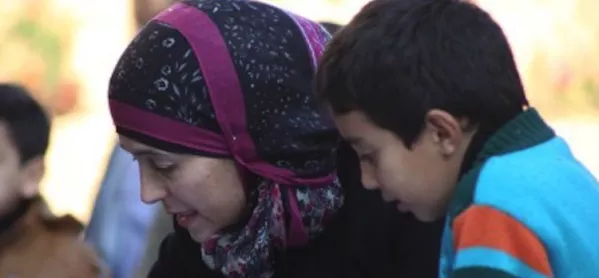- Home
- Global Teacher Prize ‘key to unlocking Palestine’s potential’
Global Teacher Prize ‘key to unlocking Palestine’s potential’

Want to keep up with the latest education news and opinion? Follow TES USA on Twitter and like TES US on Facebook.
Thousands of people will be on the edge of their seats on Sunday night as they wait to find out who has won this year’s million-dollar Global Teacher Prize, dubbed the “Nobel Prize for teaching”.
But Dr Sabri Saidam, Palestine’s education minister, will be more nervous than most. He believes that a victory for Hanan Al Hroub, one of the 10 finalists and a teacher in the West Bank (pictured, inset), could transform the region’s global standing.
“If Hanan makes it to number one, then to me, Palestine is liberated,” he tells TES in an exclusive interview ahead of the announcement of the prize at the Global Education and Skills Forum in Dubai on 13 March.
“If something of this magnitude happens, the world can no longer ignore the right for Palestinians to prosper and be free.”
Dr Saidam understands and appreciates the potential of having a globally renowned teacher as a national figurehead for Palestine. “People don’t remember politicians, no matter how competent I am or my peers are.
“They will remember a good football player, a good musician, and they will remember a good educator. So if she makes it, she will be the passport to freedom.”
Worldwide recognition would be hugely significant for a Palestinian education system facing major challenges. Its schools are hugely varied - but in the worst cases, children living in disputed territories are being taught in tents and in makeshift structures built from piles of tires, Dr Saidam says.
On top of this, the region is losing financial support for education because events elsewhere in the Middle East are causing international aid funds to be diverted in order to tackle other problems.
“We have been victimized by the fact that other pressing issues have become a priority, especially Syria and the influx of refugees,” Dr Saidam says. This year alone, he says, foreign aid to Palestine has fallen from $1.2 billion (£844 million) to $685 million, which has “really hindered our work on the development of the education sector”.
But the region’s situation does give it some educational advantages, Dr Saidam says. There is a deeply held cultural belief in Palestine about the value of education, and, as a result, this has produced some of the highest literacy rates in the Middle East.
“People believe that, if they are equipped with a proper education, they will be able to survive, no matter where they are either deported or expelled to,” he explains. “Basically, everyone turns to education. It is not debatable in Palestine.”
Dr Saidam is pressing ahead with education reforms, many of which are the opposite of those being pursued in the UK. He is overhauling the tawjihi, the high-stakes exam that pupils take at the end of their secondary education.
In the past, the publication of pupils’ exam results has “caused a scare in society”, leaving pupils feeling “hostage to fear and pressure”, Dr Saidam says.
Emphasis on technology
Under his new system, pupils will have “total flexibility” about when and how often they take the test. They will be able to postpone if they don’t feel ready to take the test and to resit it if they don’t pass.
There will also be a greater emphasis on the use of technology and on project-based assessment. This will help pupils to demonstrate their “leadership skills, initiative taking, working under pressure, teamwork and ability to be creative,” Dr Saidam says, adding proudly: “The more creative that you are, the better score you will obtain, and that will show in the final certificate.”
Dr Saidam, who has a good understanding of the English education system, having taken his A levels at a school in Chippenham, Wiltshire, says that he realizes his reforms are very different to the changes being made in the UK.
“I was in the UK quite recently and I met the minister for schools, Nick Gibb,” he says.
Dr Saidam is keen on the use of technology in the classroom and questions Mr Gibb’s focus on pen and paper; he is for traditional methods of education.
“I respect his opinion, but don’t believe it’s doable,” he says. “I believe that our kids are now more exposed to better communication skills, and can make good use of technology if it is applied well.”
The Department for Education stressed that it imposed “no limits” on the freedoms that teachers in England had to use technology in the classroom.
But Dr Saidam jokes that, despite all of the Palestinian region’s challenges, he has an offer for English secondary school pupils who are unhappy about Mr Gibb’s reforms: “Come and do your high school here.”
@kayewiggins
The Palestinian system
There are 2,860 schools in Gaza, the West Bank and East Jerusalem, Sabri Saidam, the Palestinian education minister (pictured, right), says.
Of these, 2,100 are government run, 450 are private and the rest operate in refugee camps under the UN.
The territories have a young population, with about 1.5 million school and university students in a total population of 5.1 million. There are about 49,000 teachers.
Dr Saidam is a supporter and former member of Fatah, the political movement that runs the Palestinian authority, and that governs the West Bank territories.
But he says that he resigned from Fatah after being chosen to lead the education ministry, to avoid mixing political action with serving the Palestinian people.
Keep reading for just £1 per month
You've reached your limit of free articles this month. Subscribe for £1 per month for three months and get:
- Unlimited access to all Tes magazine content
- Exclusive subscriber-only stories
- Award-winning email newsletters



